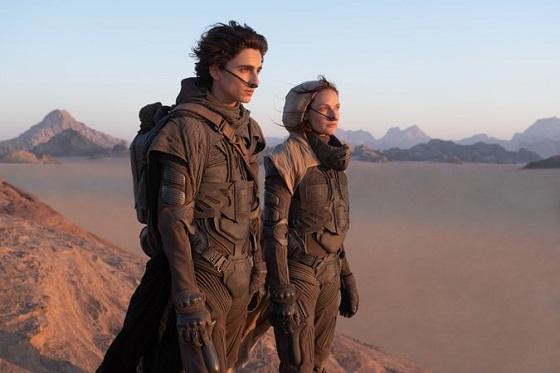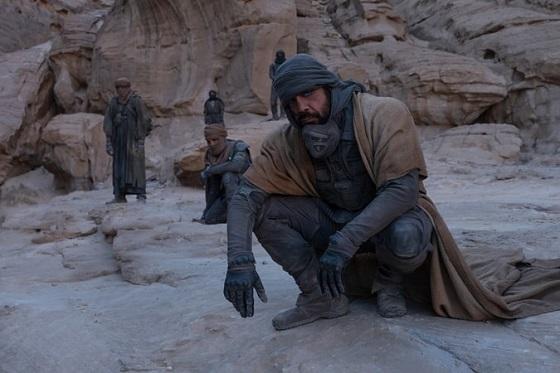

[Rating: Rock Fist Way Up]
In theaters and on HBO Max on October 22.
A sweeping, operatic immersion that suffers no compromise in any facet or detail, the long-awaited Dune adaptation is here at last. And just to get it out of the way up top, it’s friggin’ spectacular: like, holy-shit-balls they really did it “spectacular.” Clocking in at 155 minutes, and with an opening title card that establishes this installment as merely “Part 1,” the film by director Denis Villeneuve doesn’t doddle, but it’s not in any kind of rush, either. Based on a famously dense text with a raft of characters and thousands of years of history stitched into it, the film streamlines a magnificent amount of information to present an entirely coherent story with compelling, nuanced characters caught in one hell of an interesting pickle.
The basic plot of Dune isn’t an easy one to condense into bite-size morsels (just ask David Lynch and Alejandro Jodorowsky), but for the sake of the uninitiated it follows young prince Paul Atreides (Timothée Chalamet) and his royal family’s appointment as the new stewards of the desert planet Arrakis. The story takes place roughly 8000 years in the future, you see, and Arrakis is the only place where “spice” can be mined. The key component to faster than light travel, unnaturally long life, and even increased mental acuity, spice is the most valuable resource in the galaxy, meaning any change in the control of Arrakis represents a seismic social and political shift for this universe.
House Atreides taking control of Arrakis is bad news for House Harkonnen, who have been getting fat (both literally and figuratively) exploiting Arrakis and its people, the Fremen, for quite some time. The film opens with Paul having recurring dreams about the desert planet and its natives, and although Paul’s dad, Duke Leto (Oscar Isaac), seems to be taking every necessary precaution ahead of the transition, the dreams leave Paul uneasy. As it turns out, the young prince has every reason to be uneasy, as Baron Harkonnen (Stellan Skarsgård) is conspiring to violently re-take Arrakis with the help of the same emperor who put House Atreides in charge.

This is just high-level A-plot stuff, though: the story’s main guardrails. There’s also a messianic component that ties into Paul’s relationship with his mother, Lady Jessica (Rebecca Ferguson), who is a part of a socio-political faction of witches called the Bene Gesserit. Oh! And there’s also giant sandworms!
As layered and complex as all of this might sound, Villeneuve finds the right balance of exposition, foreshadowing, and even book Easter Eggs to draw all of this out in an entirely comprehensible manner. The film has a keen understanding of what the audience needs to keep its head above narrative water early on and seeds the first and second acts with JUST enough information to keep the story moving and digestible. Nothing is spoon-fed to the audience, and there are times when motivations or reasoning aren’t exactly clear, yet as the story progresses there’s always enough meat on the bone to keep the viewer interested, engaged, and hungry for more.
Villeneuve has more than a thoughtful and well-paced script working in his favor on Dune, though, he’s also got a cast to beat the band and some of the best costumes, set designs, and visual effects this side of the 21st century. The tender familial bond between Paul and his mother and father provides stakes for the action in the back half of the film, and this is a credit to the outstanding work Chalamet, Ferguson, and Isaac do in the picture. Ferguson is particularly captivating as a woman straddling two worlds, battling her duties as a mother against those of the Bene Gesserit: a struggle that takes on increasing importance as the audience learns more about Paul’s lineage and ancestry. The supporting cast is also stacked with a stable of top-tier talent that leave no performance, large or small, undercooked; Josh Brolin and Jason Momoa are particularly fun as warriors from House Atreides and provide some of the movie’s most thrilling (and outright fun) moments.

Yet Dune exists on the largest possible scale with the biggest possible stakes, so none of this would matter if Villeneuve hadn’t nailed the visuals…which he absolutely does. The film takes the time to linger on shots of fully rendered spaceships the size of skyscrapers landing just outside CGI cities with all the detail and thoughtful precision of a real metropolis. Every stitch of clothing, every helmet, blade, or bedsheet appears to be straight out of a book’s description and made just for that one moment on-screen. It’s a startling level of detail that acts as a harbinger for the production writ large, for it is clear after just a minute or two in this world that no shortcuts were taken in bringing it to life.
Yep, this is Dune without compromise: the first half of the book, anyway. Some might be left a little disappointed that the movie concludes at what feels like the halfway mark, yet those familiar with the story as a whole would likely agree that this moment is as good a place as any to break the larger piece in half. This isn’t an apple that can be consumed in one bite, and short of a 9-10 hour mini-series, it’s hard to imagine anyone doing better with the material. Exciting, interesting, transportive, and seemingly pulled straight out of the mind of Frank Herbert, Dune is the sci-fi experience of the season, and the movie fans of the book deserve.





Comments on this entry are closed.